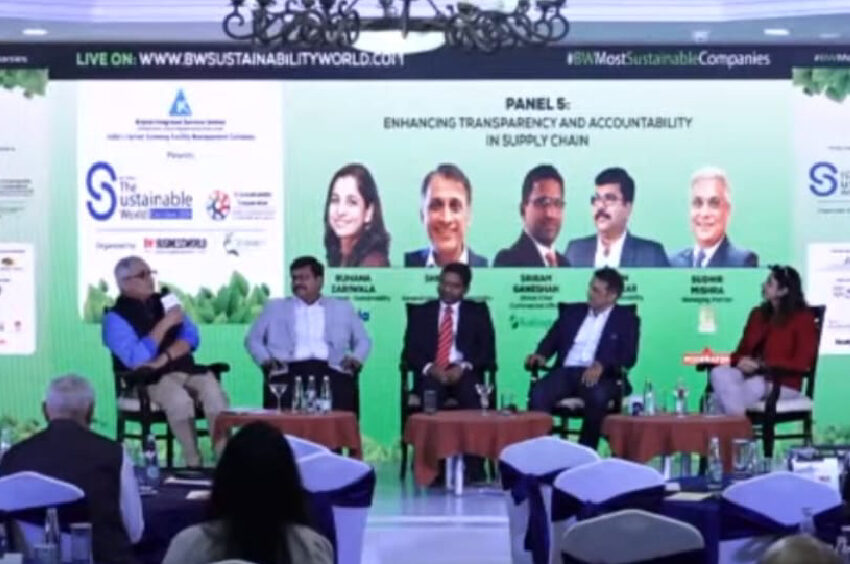Enhancing Transparency And Accountability In Supply Chains

Experts discuss the role of sustainable practices, technological innovations and collaboration in creating more responsible supply chains across sectors
Arya Rakshita
As businesses navigate the complexities of global supply chains, the need for transparency and accountability becomes increasingly critical. Sustainable practices and ethical sourcing are no longer just options but essential components for companies striving to meet consumer expectations and regulatory standards. With rising consumer awareness and stricter regulations, organisations across various sectors are re-evaluating their supply chain strategies to ensure they adhere to environmental, social, and governance (ESG) principles.
The discussion highlighted the evolving landscape of supply chain management, where transparency and accountability are becoming pivotal. According to experts, this evolving focus on ESG principles is crucial for meeting consumer expectations and regulatory demands, ultimately driving positive change in global supply chains. The discussion was
Sustainability Across The Spectrum
Talking about sustainability and India’s pharmaceutical sector, Ruhana Zariwala, Global Head of Sustainability, Cipla, emphasised the importance of comprehensive sustainability commitments within the pharmaceutical sector. She stated, “Large companies like Cipla have made significant sustainability commitments, including net zero and climate targets. However, these goals can’t be achieved without bringing the entire supply chain, including MSMEs, on board.”
She stated that Cipla focuses on responsible sourcing, having established a supplier code of conduct and sustainability policies. They are also prioritising local sourcing, with 65 per cent of procurement spend coming from local sources, including 10 per cent from MSMEs and women-led businesses. Cipla is working on decarbonisation efforts and improving supply chain data accuracy, with around 10 per cent of suppliers providing actual data for Scope 3 emissions.
Shedding light on challenges and opportunities, Shrinivas Naik, General Manager – Sustainability, Arvind Exports, discussed the environmental impact of the textile supply chain, which spans from farming to retail. “The environmental impact is significant, with around 93 billion cubic meters of water consumed annually,” he noted.
At Arvind Exports, Naik said the company addresses these issues by adopting sustainable practices, such as using better cotton, promoting organic and regenerative cotton, and pioneering waterless dyeing technologies, he adds. The company is also focused on recycling textile waste, achieving about 20 per cent recycling of fabrics, which is significantly higher than the global average. Naik points out the challenges of innovation in recycling and the need for improved waste management.
Bipin Odhekar, Head of Sustainability, Marico, shared insights into the company’s efforts in sustainable agriculture. “Marico has established digital collection centres for coconut farmers, providing transparent pricing and immediate payments,” he said. This system enhances trust and transparency in the coconut supply chain.
Marico also focuses on training and developing model farms to educate farmers on best practices. Additionally, the company has introduced agribusiness centres that offer financial support for labour, machinery, and other needs, helping small farmers thrive.
Technology And ESG
Meanwhile, talking about technology and ESG, Sriram Ganeshan, Global Chief Commercial Officer at Redington, highlighted the role of technology in ESG efforts. “When it comes to the tech supply chain, we can divide it into three key areas,” he explained.
He added that the first is sourcing, where major IT companies are using recycled components and zero plastics. The second involves optimising transportation and reducing carbon footprints. The third, and perhaps the biggest challenge, is end-of-life products. Ganeshan stresses the importance of recycling old devices and extending their lifespan to support a circular economy.
While moderating the session at the sixth edition of the Sustainable World Conclave 2024, Sudhir Mishra, Founder & Managing Partner, Trust Legal and noted environmental lawyer said that India’s unique consumer activism and progress in social issues demonstrate the potential to drive meaningful change. “While we’ve made strides, challenges remain in governance and policy advocacy,” Mishra remarked.






































































































































































































































































































































































































































































































































































































































































































































































































































































































































































































































































































































































































